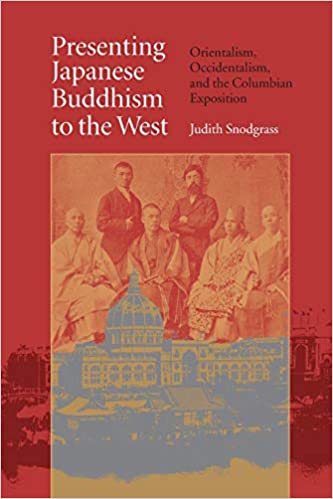Presenting Japanese Buddhism to the West
< Books
(Created page with "{{Book |BookPerson={{Book-person |PersonPage=Snodgrass, J. |PersonName=Judith Snodgrass }} |FullTextRead=No |AddRelatedTab=No }}") |
|||
| (3 intermediate revisions by the same user not shown) | |||
| Line 5: | Line 5: | ||
}} | }} | ||
|FullTextRead=No | |FullTextRead=No | ||
| + | |BookToc=****{{i|Introduction: Japan in Chicago|1}} | ||
| + | *{{i|Chapter 1. Japan Faces the West|16}} | ||
| + | *{{i|Chapter 2. Manifest Destiny: ''Christianity and American Imperialism''|45}} | ||
| + | *{{i|Chapter 3. The Rules of the Parliament: ''Securing the Truth''|65}} | ||
| + | *{{i|Chapter 4. Alterity: ''Buddhism as the "Other" of Christianity''|85}} | ||
| + | *{{i|Chapter 5. Buddhism and Modernity in Meiji Japan|115}} | ||
| + | *{{i|Chapter 6. Buddhist Revival and Japanese Nationalism|137}} | ||
| + | *{{i|Chapter 7. Deploying Western Authority I: ''Henry Steel Olcott in Japan''|155}} | ||
| + | *{{i|Chapter 8. Buddhism and Treaty Revision: ''The Chicago Project''|172}} | ||
| + | *{{i|Chapter 9. Defining Eastern Buddhism|198}} | ||
| + | *{{i|Chapter 10. Paul Carus: ''Buddhism and Monist Mission''|222}} | ||
| + | *{{i|Chapter 11. Deploying Western Authority II: ''Carus in Translation''|245}} | ||
| + | *{{i|Chapter 12. From Eastern Buddhism to Zen: ''A Postscript''|259}} | ||
| + | ****{{i|Notes|279}} | ||
| + | ****{{i|Bibliography|323}} | ||
| + | ****{{i|Index|345}} | ||
| + | |StopPersonRedirects=No | ||
|AddRelatedTab=No | |AddRelatedTab=No | ||
}} | }} | ||
Latest revision as of 13:42, 7 July 2023
Japanese Buddhism was introduced to a wide Western audience when a delegation of Buddhist priests attended the World's Parliament of Religions, part of the 1893 Columbian Exposition in Chicago. In describing and analyzing this event, Judith Snodgrass challenges the predominant view of Orientalism as a one-way process by which Asian cultures are understood strictly through Western ideas. Restoring agency to the Buddhists themselves, she shows how they helped reformulate Buddhism as a modern world religion with specific appeal to the West while simultaneously reclaiming authority for the tradition within a rapidly changing Japan.
Snodgrass explains how the Buddhism presented in Chicago was shaped by the institutional, social, and political imperatives of the Meiji Buddhist revival movement in Japan and was further determined by the Parliament itself, which, despite its rhetoric of fostering universal brotherhood and international goodwill, was thoroughly permeated with confidence in the superiority of American Protestantism. Additionally, in the context of Japan's intensive diplomatic campaign to renegotiate its treaties with Western nations, the nature of Japanese religion was not simply a religious issue, Snodgrass argues, but an integral part of Japan's bid for acceptance by the international community. (Source: University of North Carolina Press)
| Citation | Snodgrass, Judith. Presenting Japanese Buddhism to the West: Orientalism, Occidentalism, and the Columbian Exposition. Chapel Hill: The University of North Carolina Press, 2003. https://archive.org/details/presentingjapanesebuddhismtowestorientalismoccidentalismcolumbianexpositionjudithsnodgrass_743_i/mode/2up. |
|---|---|

